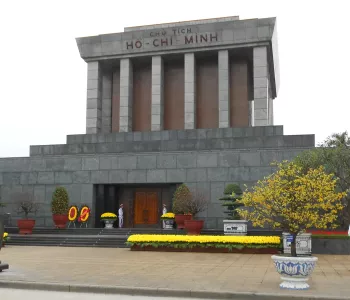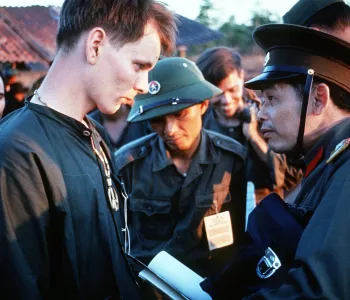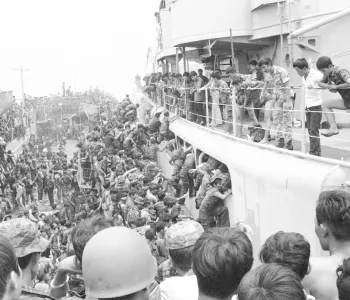d'Vinci

Van, Tien Dung
North Vietnam Military Chief of Staff from 1953-1980.

b. 1917 - d. 2002
Van Tien Dung served as the Military Chief of Staff for North Vietnam from 1953-1980. He commanded military operations during the war, and conducted the final offensive which overran South Vietnam in 1975.
Military Chief of Staff, North Vietnam, 1953; Defense Minister, North Vietnam, 1980-1987
Van Tien Dung headed the final communist offensive against U.S.-backed South Vietnam in the spring of 1975. The war came to an end on April 30 of that year as North Vietnamese tanks rolled through the gates of the Presidential Palace in Saigon, South Vietnam's capital.
Dung's military reputation in Vietnam stands second only to battlefield legend Gen. Vo Nguyen Giap, who along with Ho Chi Minh and Pham Van Dong were considered the architects of the nation's communist revolution.
Part of an elite handful of revolutionaries who masterminded Vietnam's war of independence against France, Dung was named Hanoi's military chief of staff in 1953 and went on to fight against American forces during the Vietnam War.
Dung was born in 1917 in Hanoi and joined the communist party in 1937. As a young man Van Tien Dung never thought of becoming a soldier. Soldiers were men of the French Foreign Legion who kept order for the colonial power. Like many other Vietnamese of peasant stock with little schooling he was recruited into the communist party run by Ho Chi Minh. Just as easily he was picked up by the French and jailed for belonging to an illegal organization. He spent about four years in jail, often escaping, once as a Buddhist monk, and always recaptured.
General Giap seems to have recognized Dung as a natural leader who had a firm command, despite his lack of formal education, of logistics, which played a key part in the defeat of the French at Dien Bien Phu. Like Napoleon, the two men were prepared to squander any number of lives to win.
For the final offensive of the war General Dung had under his command an army of 800,000 men. The Americans had withdrawn from Vietnam after losing 58,000 soldiers and the South was on its own. The United States' “potential for aiding its puppets is rapidly declining”, he told an approving Politburo. Even so, General Dung noted, the southerners were hard to break.
Dung replaced Giap as defense minister in 1980 and was an advocate of a large standing army. Criticized from within the army for his autocratic style and rumors of family corruption, he was replaced in 1987 during a cabinet shuffle.
Van Tien Dung served as the Military Chief of Staff for North Vietnam from 1953-1980. He commanded military operations during the war, and conducted the final offensive which overran South Vietnam in 1975.
Military Chief of Staff, North Vietnam, 1953; Defense Minister, North Vietnam, 1980-1987
Van Tien Dung headed the final communist offensive against U.S.-backed South Vietnam in the spring of 1975. The war came to an end on April 30 of that year as North Vietnamese tanks rolled through the gates of the Presidential Palace in Saigon, South Vietnam's capital.
Dung's military reputation in Vietnam stands second only to battlefield legend Gen. Vo Nguyen Giap, who along with Ho Chi Minh and Pham Van Dong were considered the architects of the nation's communist revolution.
Part of an elite handful of revolutionaries who masterminded Vietnam's war of independence against France, Dung was named Hanoi's military chief of staff in 1953 and went on to fight against American forces during the Vietnam War.
Dung was born in 1917 in Hanoi and joined the communist party in 1937. As a young man Van Tien Dung never thought of becoming a soldier. Soldiers were men of the French Foreign Legion who kept order for the colonial power. Like many other Vietnamese of peasant stock with little schooling he was recruited into the communist party run by Ho Chi Minh. Just as easily he was picked up by the French and jailed for belonging to an illegal organization. He spent about four years in jail, often escaping, once as a Buddhist monk, and always recaptured.
General Giap seems to have recognized Dung as a natural leader who had a firm command, despite his lack of formal education, of logistics, which played a key part in the defeat of the French at Dien Bien Phu. Like Napoleon, the two men were prepared to squander any number of lives to win.
For the final offensive of the war General Dung had under his command an army of 800,000 men. The Americans had withdrawn from Vietnam after losing 58,000 soldiers and the South was on its own. The United States' “potential for aiding its puppets is rapidly declining”, he told an approving Politburo. Even so, General Dung noted, the southerners were hard to break.
Dung replaced Giap as defense minister in 1980 and was an advocate of a large standing army. Criticized from within the army for his autocratic style and rumors of family corruption, he was replaced in 1987 during a cabinet shuffle.


